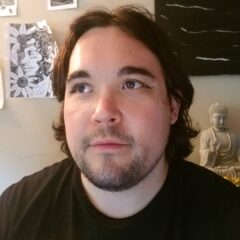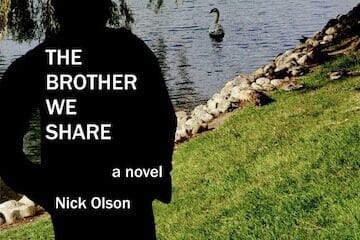Cease, Cows readers may remember “Greatest Hits” by Nicholas Olson, a favorite from a few years back. Nick’s latest work is The Brother We Share, an intriguing metafiction hybrid about the character “Nick Olson” and what might have happened to the real Nick Olson had his life gone a different way. It’s a compelling tale of emotional healing.
Pick up your copy here.
Olson recently shared his thoughts with Cease, Cows.
Chuck Augello: How might you describe The Brother We Share to a potential reader?
Nick Olson: The Brother We Share is an adult fiction meditation on the impact of suicide and the winding path of grief and recovery. It’s a sort of alternate personal history that takes a real event, a suicide attempt that I survived in 2016, and explores what could’ve happened had I not survived. It centers around my brothers and friends who became brothers, and it’s a kind of creative nonfiction/fiction experimental hybrid that touches on themes of friendship, brotherhood, mental health, grief, and a healing process that at times can feel like living through a glitch in the real world.
CA: What was your initial inspiration for this story? Was there a moment when you realized that you had a novel in mind?
NO: I knew I had to write this or something like it eventually. One thing that’s at the core of who I am as a writer, and I guess just as a person, is this tendency to dive headfirst into the things that scare me the most. To see if I can find beauty on the other side of pain, and maybe help someone else feel a little less alone. It might sound strange, but I knew I had to write this because of how much it scared me. I knew that, just about five years on from the event, it was finally time.
CA: The Brother We Share features multiple first-person narrators. What interested you in telling the story that way? What was the biggest challenge?
NO: I played around with that concept in Here’s Waldo, but Waldo was the throughline in that book, with other characters’ POV chapters included as interludes. I wanted to really push myself with multiple first-person narrators in this book, and it felt very important to be able to show all the different ways that grief’s tendrils can touch, all of the stages of it and the personal journeys involved. That, and I wanted a way to speak to just how many connections and touchpoints there are in every single life. The interpersonal web and chain of causality that goes through all of us, down and into the future. The biggest challenge (and greatest joy) was diving headfirst into the mindset and POV of my brothers, figuring out how to capture their particular ways of speaking and relating. I ran all of their chapters by them before ever sending this manuscript out, and I was pleased/excited to hear just how eerily accurate they apparently were in most cases!
CA: A key character is CJ Olson’s missing older brother, Nick Olson, who we’re told has written an unfinished novel titled Here’s Waldo. Your name is Nick Olson, and you’ve published a novel by the same name. What do you expect readers to take from that?
NO: This was something that was important to me from the outset. I knew that if I was going to tell this story, really tell it, it’d have to be honest. I’d dipped my toes into semi-autobiographical stuff with Here’s Waldo, but at the end of the day he wasn’t me, and that distance was protective. It terrified me at first, thinking about being this open about something so personal, so hard. But I decided that the benefits of maybe connecting with other folks who have gone through or are going through similar things would outweigh that initial discomfort. Then I got a few pieces published, both excerpts from this and outright CNF about the attempt/aftermath, and it just became a lot easier. The messages and emails I’ve gotten from that work have meant the world to me. I’ve gotten so much support, so many people reaching out with their own similar stories, thanking me for sharing mine and helping them feel a little less alone. So yeah, I figure it’s worth it to be this open. At least it is for me, for this.
CA: A key element of The Brother We Share is the difficulty of writing and the challenges of capturing one’s thoughts and memories and translating them into a narrative. How did the characters’ experiences reflect your own experience with writing this novel?
NO: That’s an excellent question. I feel like for me it goes back to that idea that you can’t go home again. I’ve always been taken with the fickleness of memory, how drastically your perspective on yourself, your life, where you came from, all of it can change over time–with age, on reflection. Many (but not all) of these characters don’t write fiction or creative nonfiction themselves, so it started out as a practical way for them to work through this process that they’re not accustomed to. And then in the telling of it, it became a way for me to explore my own frustrations with the memory versus the narrative portrayal of the memory. It was me going from wanting the draft to perfectly match the initial idea to acceptance of the story as it wanted to be told.
CA: In the novel you write, “We’re rocketing through our lives, hurtling forward in time and space, racing toward an end that will be another beginning.” How does the passage of time influence the story?
NO: This was something else I really wanted to push myself with. Here’s Waldo followed its main character from age eight to twenty-four, from the late ’90s to the 2010s, and then with the interlude chapters it went farther back in time with each one, all the way back to the 1950s in one section, so there was this multi-generational, larger kind of scope. With The Brother We Share, I wanted it to be about six months in the lives of these characters. I wanted the reader to live this with them, as close as possible to the events so that they could almost feel like a member of the group. And then, too, it was me trying to explore the dilation of time that comes with growing up, the speed of years as they pass.
CA: The Brother We Share includes references to the pandemic and spending too much time on Zoom. How much of the novel was written during the pandemic? Did the pandemic change the way you approached this material?
NO: This was all written during the pandemic. I took an unusual (and pretty difficult) approach by writing this chronologically as it was happening. So the book takes place primarily from July 2020 to January 2021, and that’s the same timeframe I was writing the first draft in, crafting this alternate timeline while at the same time living through the actual one. That meant writing every day for six months straight until the first draft was done. Not sure I’ll ever do something like that again, but I’m glad I did it for this. So much of this story has to do with the uncanny nature of imagining what could’ve been, seeing splintering alternate realities while living through just the one you’ve been given, so writing this in that way really lent itself to that concept, I feel.
CA: If you could go back in time and tell your younger self one thing that you’ve learned about yourself as a writer, what would it be?
NO: It’ll happen. You’ll be okay. Everything will work out in the end.
CA: Who are some of the authors whose work excites you?
NO: I absolutely love the work of Susan Triemert. Having her blurb this book was such a cool, full-circle moment for me. I’ve been mostly reading short work lately, and there are so many writers out there doing just incredible things. Hannah Grieco, Jillian Luft, Jamy Bond, Eric Scot Tryon, Cathy Ulrich, Melissa Llanes Brownlee, Tommy Dean, Jacqueline Doyle… the list goes on and on, really. I’ve said it before, but this is such an incredible time to be a reader, a lover of literature.
CA: Finally, there’s no shortage of ways to spend one’s time. Why do you choose to write fiction?
NO: I’m not sure I have any other choice. I always come back to this, no matter how much time I take off between projects, no matter what else I try. I think I need this, and I think I’m okay with needing it. It’s a constant and joy in my life, a way for me to process, understand, and hopefully sometimes connect. I love this life, and there’s not another one I’d pick if I could.

–
Chuck Augello (Contributing Editor) lives in New Jersey with his wife, dog, two cats, and several cows that refuse to cease. His work has appeared in One Story, Juked, Hobart, SmokeLong Quarterly, and other fine places. He publishes The Daily Vonnegut and contributes interviews to The Review Review.

